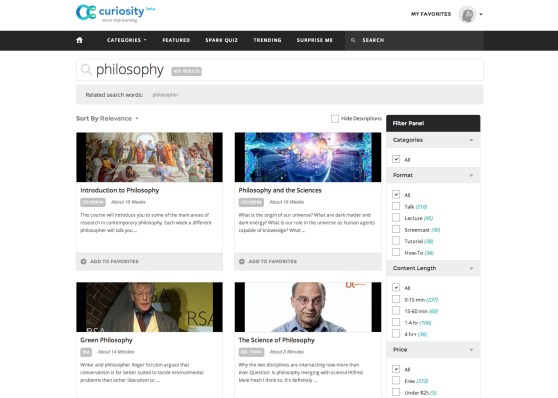Discovery Communication has satisfied the world’s curiosity for nearly 30 years, teaching us about things as varied as why men have nipples and the mischievous machinations of beavers.
Today the venerable purveyor of educational media launched Curiosity.com, an online marketplace that features learning-oriented content from around the Web.
“People often want to learn, but they don’t know what they want to learn — should they learn about their hobby, their job, or the job they wish they had? There is choice fatigue,” Curiosity’s head Gabe Vehovsky said in an interview. “To take time out of your life to feed your mind and be inspired, you need something to ignite that curiosity.”
The Internet holds a vast wealth of educational content, but it’s on dozens of different sites; it lacks one central place where people can go to find, filter, rank, and organize content that interests them.
The Discovery Channel plans for Curiosity to become that hub.

Above: Here’s how Curiosity.com’s course listings look like.
The site has content from 76 online education providers, including well-known MOOCs like Khan Academy and Coursera and DIY site Craftsy. At launch, Curiosity should have around 100,000 talks and videos in its database on a wide range of topics
Curiosity provides search filters for inputting preferences on topics or class types, such as free versus paid, or scheduled versus anytime. The site also has a “spark quiz” that prompts you with questions, such as “which magazine would you rather read,” to recommend content. People can pick and choose videos from various topics and providers and organize them into their own collections.
“We want Curiosity to introduce people to something new, something they didn’t even know interested them, whether that’s chess, astronomy, cake decorating, chemistry, economics, genetics, investments, or gardening,” Vehovsky said. “People are happy to view their education days in a rearview mirror, and that’s a shame. If we can help make learning online a more predominant activity, that’s the best case scenario.”
Vehovsky is the executive vice president of digital strategy and emerging businesses at Discovery Communications — an international conglomerate with 2 billion subscribers, 50 network entertainment brands, and more than 40 digital video channels.
The “emerging businesses” team focuses on new digital initiatives. Part of Vehovsky’s job is to stay on top of technology trends. He observed the rise of both online education and vertical marketplaces, but he also saw a gap between the two.
Online education is indeed a crowded space. We’ve got Khan Academy, Coursera, Udacity, Udemy, and Lynda.com, and those are just the major players. For someone not well acquainted with the various platforms or unsure about what they want to learn, this landscape can be overwhelming.
“We’ve seen this trend of vertically centric marketplaces that makes content for a particular genre more accessible, but nothing in the online learning space,” Vehovsky said. “We want to give people options, and be that rising tide that helps all the boats rise in the online learning space.”
Vehovsky said Curiosity’s target audience are lifelong learners, rather than someone pursuing an academic degree or career enhancement. Like other Discovery properties, it is about learning for the sake of learning.
Sample courses include “Sports and Society,” a Duke University course featured on Coursera; “How Nanotechnology will end diseases,” a talk given by Ray Kurzweil via the AOL On Network; Udemy course “iPhone Photography Pro; and a seven-part lesson plan from Craftsy on “Building Flavorful Soups.”
VentureBeat's mission is to be a digital town square for technical decision-makers to gain knowledge about transformative enterprise technology and transact. Learn More

